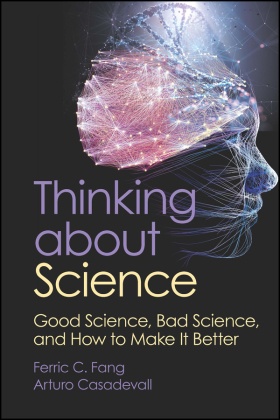
Thinking about Science - Good Science, Bad Science, and How to Make It Better
| Verlag | Wiley & Sons |
| Auflage | 2023 |
| Seiten | 544 |
| Format | 14,9 x 22,3 x 2,5 cm |
| Gewicht | 666 g |
| Artikeltyp | Englisches Buch |
| Reihe | ASM |
| EAN | 9781683674344 |
| Bestell-Nr | 68367434UA |
Thinking about Science: Good Science, Bad Science, and How to Make It Better
A riveting exploration of the world of science, diving headfirst into its triumphs and tribulations.
Penned by seasoned microbiologists Ferric C. Fang and Arturo Casadevall, this book offers a comprehensive analysis of the scientific enterprise through various lenses, including historical, philosophical, and personal.
From their unique vantage points as researchers, clinicians, and educators, Fang and Casadevall dissect the intricate mechanisms of science, shedding light on its strengths and weaknesses. Through engaging historical anecdotes, personal narratives, and insightful academic studies, they present a candid evaluation of science's performance, including a thought-provoking examination of its role during the COVID-19 pandemic.
A must-read for anyone curious about the present predicaments and future potential of science, Thinking about Science: Good Science, Bad Scie nce, and How to Make It Better is more than just a book; it's a roadmap to understanding and improving the scientific endeavor for the benefit of society at large.
"The authors have given us a thoughtful description of science and the joy of discovery, an unflinching diagnosis of where improvements are needed, and recommendations for remedies well worth considering. Scientists, science and society would benefit if this book were read by both future and established scientists, as well as the administrators, policymakers, and regulators who are in a position to help us do better."
Michael Kalichman, UC San Diego
"With a deep understanding of the profound impact of science on society, the authors provide thought-provoking perspectives on changes in the scientific enterprise that will support sustainable, equitable practices, and engender public trust. An engaging read for everyone with an interest in science or science policy."
Stanley Maloy, San Diego State Uni versity
